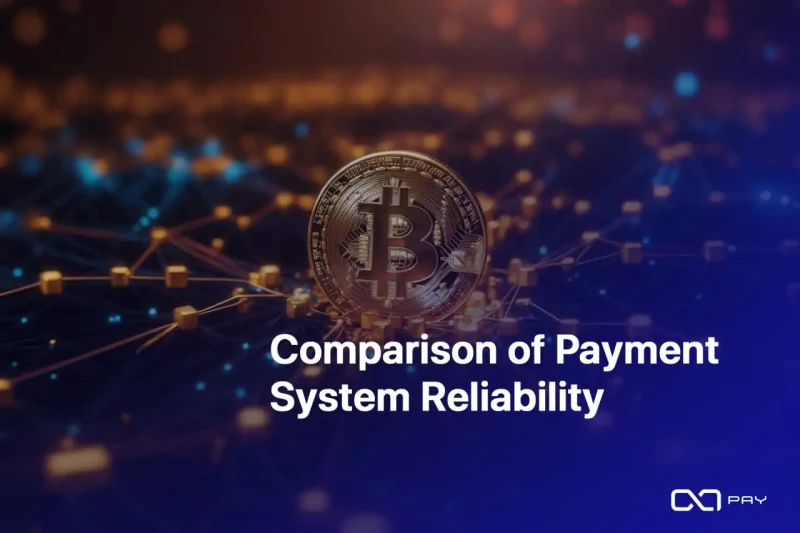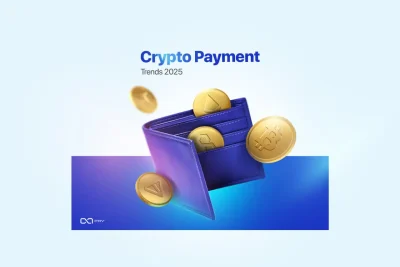Reliability of payment system are crucial for both businesses and consumers. This article compares traditional payment networks like Visa, MasterCard, and SWIFT with the new blockchain technology and Bitcoin. This analysis helps businesses understand which payment options are best for their needs in terms of security, efficiency, and growth on a global scale.
What is reliability in a payment system?
Reliability in a payment system refers to the system’s ability to consistently and accurately process transactions without errors, delays, or failures. This reliability is essential, as it ensures that both merchants and customers can trust and rely on the system for all their transactions. Here are several key factors that contribute to a payment system’s reliability:
1. Uptime and Availability:
The system should be operational and available at all times, minimizing downtimes which can lead to transaction failures or delays.
2. Accuracy:
Transactions must be processed accurately, ensuring that funds are correctly debited and credited without any discrepancies.
3. Security:
A reliable payment system must be secure, protecting against fraud, theft, and unauthorized access to ensure that transactions are legitimate and users’ data is safe.
4. Scalability:
The system should be able to handle high volumes of transactions, especially during peak times, without performance degradation.
5. Redundancy:
Good payment systems have backups and fail-safes in place to ensure that the system can continue to operate smoothly even if there are issues with one part of the system.
6. Compliance:
Adhering to industry standards and regulations ensures that the payment system remains reputable and trustworthy.
7. User Experience:
Ensuring that the system is easy to use and responsive also contributes to its reliability, as it affects how confidently users interact with it.
The reliability impact of a payment system for businesses
The reliability of a payment system has profound impacts on businesses, influencing customer satisfaction, operational efficiency, and financial health. Here’s a detailed look at how payment system reliability affects various aspects of a business:
1. Customer Trust and Satisfaction:
- A reliable payment system ensures that transactions are processed smoothly and securely, which enhances customer trust. When customers experience no issues with payments, their overall satisfaction with the service increases, which can lead to repeat business and positive word-of-mouth.
- Conversely, unreliable payment systems can lead to transaction failures or delays, frustrating customers and potentially driving them to competitors.
2. Operational Efficiency:
- Businesses rely on efficient payment processing for smooth operations. A reliable system minimizes the need for manual interventions, which can be both time-consuming and prone to errors.
- Automated and reliable payment processes help streamline operations, allowing staff to focus on other critical business activities rather than troubleshooting payment issues.
3. Revenue Flow and Financial Stability:
- Payment system reliability directly impacts a business’s cash flow. Reliable systems ensure that payments are processed promptly, leading to better cash flow management.
- Unreliable systems may cause delays in funds being available, which can affect a business’s ability to meet its financial obligations on time, such as payroll, supplier payments, and other operational expenses.
4. Reputation and Brand Image:
- A reliable payment system contributes positively to a business’s reputation. Consistently providing a hassle-free payment experience can set a business apart from its competitors.
- Frequent issues with a payment system can tarnish a company’s reputation, making it appear less professional and potentially unreliable.
5. Scalability of Business Operations:
- As businesses grow, they need a payment system that can scale with their increasing transaction volumes. A reliable system can handle growth without performance issues, supporting the business as it expands.
- Lack of scalability and reliability can hinder growth, as businesses may struggle to process an increasing number of transactions efficiently.
6. Risk and Compliance Management:
- Reliable payment systems help businesses comply with regulatory requirements related to financial transactions, reducing the risk of fines or legal issues.
- They also minimize the risk of fraud and security breaches, which can have significant financial and legal repercussions.
Overall, the reliability of a payment system is integral to maintaining a positive customer experience, ensuring operational continuity, and supporting business growth. Any deficiencies in reliability can have ripple effects across all areas of a business, highlighting the importance of investing in and maintaining a robust payment infrastructure.
Traditional Payment Networks
1. Visa, MasterCard, and American Express
- Reliability: These networks provide extensive global coverage and are supported by sophisticated infrastructure designed to handle massive transaction volumes with minimal downtime.
- Limitations: Centralization poses inherent risks, including potential system-wide outages and targeted cyber attacks. Additionally, while rare, disruptions do occur and can impact transaction processing times and reliability.
2. PayPal
- Reliability: Known for its consumer-centric model, PayPal offers a user-friendly interface and quick resolution of disputes.
- Limitations: Higher transaction fees and the possibility of account limitations or freezes can disrupt business operations, affecting reliability from a merchant’s perspective.
3. SWIFT
- Reliability: As the backbone of international banking communication, SWIFT facilitates secure and reliable cross-border payments.
- Limitations: The system’s reliance on a network of banks can lead to delays and inefficiencies, particularly in the face of international sanctions or banking regulations.
4. ACH Network
- Reliability: Ideal for domestic bulk transactions, such as payroll, due to its cost-effectiveness and high success rates.
- Limitations: Slower transaction speeds and next-day settlement times can hinder businesses needing immediate fund transfers.
Blockchain and Bitcoin
1. Decentralization
- Unlike traditional systems, blockchain operates on a decentralized model, reducing single points of failure and virtually eliminating the risk of centralized control and downtime.
2. Security
- Blockchain technology offers enhanced security features. Each transaction is encrypted and linked to the previous transaction, creating an immutable ledger, which is virtually impossible to alter without consensus from the network.
3. Transparency and Trust
- The transparent nature of blockchain ensures that all transactions can be verified by any party at any time, building trust without the need for intermediaries.
4. Speed and Cost-Effectiveness
- For Bitcoin and other cryptocurrencies, transactions can be significantly faster than traditional wire transfers, especially across borders. Additionally, transaction fees can be lower, providing cost benefits to businesses.
Expanded Comparative Table on Payment System Reliability
Paymet System | Uptime/Reliability | Security Features | Transaction Speed | Network Outages | Cost to Businesses | Security Assessment | Universal Access |
99.99% | Encryption, tokenization, real-time fraud detection | Seconds | Rare, documented outages | 1.4% - 2.9% per transaction + fees | High | Global (accepted in most countries) | |
99.99% | Encryption, tokenization, real-time fraud detection | Seconds | Rare, documented outages | 1.4% - 2.9% per transaction + fees | High | Global (accepted in most countries) | |
99.98% | Encryption, advanced fraud detection, premium security services | Seconds | Minimal, less frequent | Approx. 2.5% - 3.5% per transaction + fees | Very High | High (accepted in many countries, less than Visa/MasterCard) | |
99.98% | Data encryption, fraud models, buyer and seller protection | Instant to days | Occasional outages | 2.9% + $0.30 per transaction (varies internationally) | High | High (available in over 200 countries) | |
99.90% | Secure messaging, compliance checks, end-to-end encryption | Minutes to days | Rare, external factors | $5-$50 (international transfers, varies by banks and countries) | Very High | Global (used by banks worldwide) | |
99.90% | Compliance standards, encryption, batch processing | 1-2 days | Very rare | $0.20 - $1.50 per transaction (often less for bulk transactions) | Moderate | Limited (primarily U.S. domestic) | |
100% | Blockchain technology, cryptographic security, no central point of failure | 10 minutes (average) | No network outages | Transaction fees vary (recently avg. $1-$5, but can be higher) | Very High | Global (no geographical restrictions, internet access required) |
Notes:
- Uptime/reliability metrics are based on publicly available data and industry norms.
- Visa and MasterCard encounter rare, quickly resolved network issues.
- American Express is highly reliable, though slightly less prominent in the payment network.
- PayPal occasionally faces disruptions, which are typically short-lived.
- SWIFT outages are infrequent and often caused by external factors.
- The ACH Network is highly reliable for bulk transactions but not for instant needs.
Discussion:
- Uptime: Traditional payment networks consistently show high reliability, exceeding 99.9% uptime. Bitcoin excels with 100% uptime, thanks to its decentralized structure eliminating single failure points and offering superior security against fraud through immutability and encryption.
- Costs to Businesses: Transaction costs vary; traditional networks usually charge a percentage plus fixed fees, which can be costly for large transactions. PayPal’s fixed fees make small transactions expensive. Bitcoin’s transaction fees are variable, generally lower, providing cost benefits.
- Security Assessment: Traditional networks like Visa, MasterCard, and SWIFT, and American Express, which is particularly stringent, ensure high security through advanced encryption and compliance with global standards. The ACH Network’s focus on non-instant bulk processing offers moderate security. In contrast, Bitcoin’s decentralized nature provides very high security, making it resistant to tampering.
- Global Access: Visa and MasterCard are widely accepted globally, while American Express sometimes faces lower acceptance abroad. PayPal is versatile but requires internet access and linkage to financial accounts. SWIFT is crucial for international wires but limited to bank network availability. The ACH Network is primarily U.S.-based. Bitcoin, not reliant on traditional banking systems and immune to international sanctions, offers unrestricted global access, making it an attractive choice for maintaining global transaction continuity amid geopolitical tensions.
These insights can help businesses choose payment systems that meet their operational and reliability needs. Traditional systems boast near-perfect uptimes, but Bitcoin offers unmatched uptime, enhanced security, lower costs, and global access, making it a compelling option for those prioritizing reliability.
Embracing Blockchain for Business
After comparing various payment systems, it’s clear that blockchain, especially Bitcoin, is highly reliable, cost-effective, and offers unlimited global access. These features make it a top choice for businesses looking for a strong payment solution. To take advantage of these benefits, businesses can use OxaPay crypto payment gateway. This payment gateway helps businesses accept Bitcoin and other cryptocurrencies easily.
Leveraging OxaPay for Seamless Crypto Transactions
OxaPay offers capabilities that surpass those of traditional Bitcoin transactions, providing enhanced services at competitive costs. Its high-security measures and user-friendly interface eliminate the need for extensive know-your-customer (KYC) procedures, streamlining the integration process. This enables businesses to easily incorporate Bitcoin and other cryptocurrency payments into their operations. By adopting OxaPay’s solutions, businesses can leverage the inherent benefits of cryptocurrencies to achieve more efficient, secure, and cost-effective transactions, enhancing their competitive edge in the global market.
conclusion
As we’ve seen, traditional payment networks offer robust reliability and widespread acceptance, but they come with inherent limitations that blockchain technology can overcome. Bitcoin, supported by its decentralized nature and enhanced security features, provides an appealing alternative for global transactions without the constraints of traditional financial systems. For businesses looking to harness these advantages, OxaPay stands out as a compelling solution. OxaPay simplifies crypto integration with its user-friendly interface and robust security features, empowering businesses to unlock the potential of cryptocurrencies for efficient and cost-effective global transactions.




